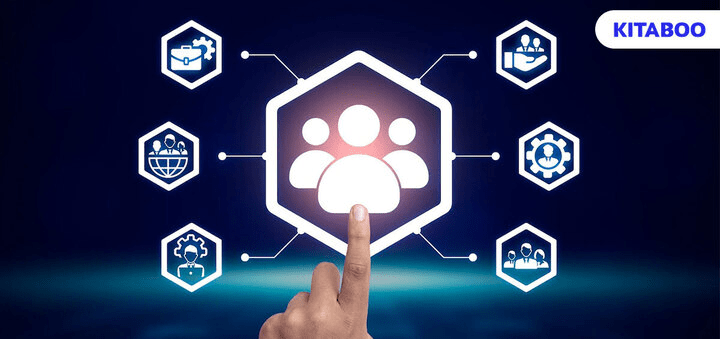
The Ultimate Guide to Effective User Management
Summarize this blog with your favorite AI:
User management is the art of overseeing users’ digital interactions, from secure access to online spaces to utilizing digital services and providing support across software, devices, websites, cloud services, and networks. Effective user management leverages technology advancements to enhance user experiences.
Studies show that feedback from just five users can uncover 85% of website issues, highlighting the need for effective user management. This approach involves identifying user needs, creating flexible policies, ensuring digital service security, managing user data, and simplifying login and account access.
In this regard, note that digital textbook platforms like KITABOO have revolutionized user management in educational settings. With this platform, educators can easily manage student accounts, track progress, and provide personalized learning experiences.
Table of Contents:
I. Components of User Management
II. Why is Effective User Management Crucial for Organizations?
- Effective User Authentication, Authorization, and Access Control
- Automates User Management
- Provides Cloud Access and Leverage Multiprotocol
- Designs Effective Policies
- Efficiently Handles User Accounts
III. Benefits of Effective User Management
- Ensures Streamlined User Onboarding
- Reduces Cost, Errors, and Complexity
- Improved Data Integrity and Security
- Promotes Operational Efficiency
- Increases User Accountability
IV. Conclusion
I. Components of User Management
User management encompasses various critical components that are essential for overseeing and optimizing users’ digital interactions within organizations or systems. These components play a crucial role in ensuring efficient, secure, and user-friendly experiences.
Key components of effective user management include the following:
- Access Control for SaaS and Applications: Giving appropriate access to users on SaaS services, storage systems, and other applications.
- Authorization Platforms: Implementing authorization platforms that securely manage and maintain key user information.
- Resource Deployment: Deploying essential resources, including hardware, software, and network infrastructure, to optimize the user experience.
- Web Application and Cloud Infrastructure Management: Managing web applications, cloud infrastructure, and non-Windows devices.
As organizations adopt more tools, user access control gets harder when apps and subscriptions aren’t centrally visible. SaaS management platforms help teams track app usage, manage licenses, and reduce shadow IT – making role-based access and offboarding more reliable.
II. Why is Effective User Management Crucial for Organizations?
In this modern world, organizations that depend on the effective application of technological advancements recognize the paramount importance of prioritizing effective user management.
Below are the key reasons effective user management is crucial for organizations:
1. Effective User Authentication, Authorization, and Access Control
Effective user management leads to verifying the identity of a user using biometrics, passwords, or two-factor authentication. This helps organizations confirm identities and determine actions that allow users to perform within the digital systems.
Organizations can also effectively define and manage user access to specific resources and permissions. Further, it leads to active monitoring of user accounts and prevents suspicious access.
2. Automates User Management
Automating user management by using identity and access management (IAM) software streamlines user accounts, manages user access to specific resources and data, assigns permissions and roles to users, and reduces the workload on IT administrators.
3. Provides Cloud Access and Leverage Multiprotocol
In the contemporary business landscape, numerous organizations have transitioned from conventional on-premises user management structures to centralized cloud-based systems.
This helps users connect to resources that are fully capable of functioning in any environment, on-premises, in the cloud, and even in between.
An effective system should possess the versatility to manage multiple protocols and execute essential functions such as:
- Implementation of product-led growth that can ultimately create satisfied and loyal customers.
- Reliance on convenient or secure user management mechanisms
- Continuous monitoring of user behavior and provision of a convenient mechanism for managing individual and multiple user access.
- Integration with network segmentation can ultimately enforce boundaries according to the organization’s user access policies.
- Password-based authentication that helps prevent cyber-attacks.
4. Designs Effective Policies
Organizations can incorporate better decision-making and design effective policies related to user accounts, roles, permissions, and groups. This helps them define, plan, implement, control, and follow-up access permitted to relevant systems and set up policies when business requirements change.
5. Efficiently Handles User Accounts
Effective user management includes creating, modifying, and deleting user accounts, as well as managing user access and permissions. It helps in implementing proper access controls and minimizing the risk of unauthorized access.
III. Benefits of Effective User Management
Effective user management doesn’t just benefit users; it paves the way for comprehensive success within organizations.
Below are some of the invaluable advantages it delivers:
1. Ensures Streamlined User Onboarding
With effective user management, user onboarding becomes a seamless process. It becomes easier for organizations to provide access to users for specific resources rather than depending on internal admin services.
This further enhances productivity by giving users the required access to the cloud services and helping them start immediately without having to wait for access.
2. Reduces Cost, Errors, and Complexity
Manual management of user resources can be time-consuming, complex, and costly. It is always better to integrate all user-related services and activities into one centralized system, wherein provisioning can be automated and errors can be mitigated.
It further helps organizations eliminate user downtime, which eventually results in more productivity, lower operational expenses, and improved operational efficiency.
3. Improves Data Integrity and Security
Effective user management ensures better management of user permissions, appropriate access to data, and prevention of data manipulation.
Furthermore, automation reduces the risk of security threats and network or data breaches. It also helps organizations and industries to meet regulatory requirements regarding data privacy and security.
4. Promotes Operational Efficiency
Effective user management optimizes resource allocation, streamlines account management, and eliminates inactive accounts. Users are equipped with advanced tools and access levels, mitigating inappropriate permissions and bottlenecks, thus fostering operational efficiency.
5. Increases User Accountability
When organizations explore effective user management, they can track and audit user activities, foster accountability, and address faulty or suspicious incidents.
It also allows for seamless adjustments to user access and permissions, enforces strong password policies, and updates credentials that enhance the overall security of a system.
IV. Conclusion
Effective user management is all about handling comprehensive digital services that can be organizational, procedural, or technical. It leads to the desired user experience and enhances the compliance, efficiency, and security of user-related activities.
The range of benefits acquired from effective user management leads to the overall success of an organization and a fundamental approach to safeguarding the authenticity and integrity of systems and data.
In this regard, organizations can rely on digital services and extensive AI-empowered platforms like KITABOO. It not only simplifies user management but also sets a benchmark for delivering seamless and secure digital experiences.
Write to us at contact@kitaboo.com to know more!
Also check:
Discover how a mobile-first training platform can help your organization.
KITABOO is a cloud-based platform to create, deliver & track mobile-first interactive training content.


